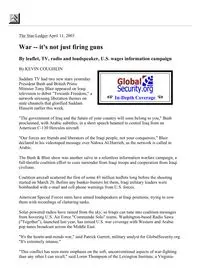
Iraq 03 PDF
Preview Iraq 03
The Star-Ledger April 11, 2003 War -- it's not just firing guns By leaflet, TV, radio and loudspeaker, U.S. wages information campaign By KEVIN COUGHLIN Saddam TV had two new stars yesterday. President Bush and British Prime Minister Tony Blair appeared on Iraqi television to debut "Towards Freedom," a network stressing liberation themes on state channels that glorified Saddam Hussein earlier this week. "The government of Iraq and the future of your country will soon belong to you," Bush proclaimed, with Arabic subtitles, in a short speech beamed to central Iraq from an American C-130 Hercules aircraft. "Our forces are friends and liberators of the Iraqi people, not your conquerors," Blair declared in his videotaped message over Nahwa Al-Hurrieh, as the network is called in Arabic. The Bush & Blair show was another salvo in a relentless information warfare campaign, a full-throttle coalition effort to coax surrender from Iraqi troops and cooperation from Iraqi civilians. Coalition aircraft scattered the first of some 43 million leaflets long before the shooting started on March 20. Before any bunker-busters hit them, Iraqi military leaders were bombarded with e-mail and cell phone warnings from U.S. forces. American Special Forces units have aimed loudspeakers at Iraqi positions, trying to cow them with recordings of clattering tanks. Solar-powered radios have rained from the sky, so Iraqis can tune into coalition messages from hovering U.S. Air Force "Commando Solo" teams. Washington-based Radio Sawa ("Together"), launched last year, has mixed U.S. war coverage with Western and Arabic pop tunes broadcast across the Middle East. "It's the hearts-and-minds war," said Patrick Garrett, military analyst for GlobalSecurity.org. "It's extremely intense." "This conflict has seen more emphasis on the soft, unconventional aspects of war-fighting than any other I can recall," said Loren Thompson of the Lexington Institute, a Virginia- In-Depth Coverage based think tank. He cited information warfare, also known as psychological warfare, or "psy-ops." "Traditionally, war is about bringing heavy metal to bear on the enemy," Thompson said. "In this conflict, there is psy-ops, coalition-building, humanitarian activity -- all sorts of nonmilitary activities." Psy-ops date at least to Alexander the Great, who supposedly ordered retreating soldiers to leave behind giant-sized breastplates and helmets to intimidate foes. In the American Revolution, Colonials sought to sour British troops with leaflets contrasting their sorry lot with high-living officers. Japan's Tokyo Rose goaded U.S. sailors by radio in World War II, while Nazi leaflets told British troops their wives were servicing the Yanks' bases back in England. And who can forget Panama, where American forces blasted Van Halen music at strongman Manuel Noriega, 24-7. The Iraq psy-ops campaign emanates from the Army's 4th Psychological Operations Group at Fort Bragg, N.C., with a little help from the White House Office of Global Communications. Iraqi exiles helped plan the new TV service, which will feature Iraqi journalists and "coalition public service announcements" for an hour each day, British officials told Reuters. They said "Towards Freedom" will be extended from Baghdad to the rest of Iraq soon, and will continue until new national media are established. Coalition forces also introduced a newspaper, "The Times," to southern Iraq yesterday. Though psy-ops are flashy, their impact is hard to gauge. Military people say such measures should dispel any Arab doubts of U.S. resolve. "I don't think they're missing the message: We're going to do what we say we're going to do," said retired Army Col. John G. Lackey, assistant commandant of the Citadel in South Carolina. In Qatar yesterday, U.S. Maj. Gen. Victor Renuart credited coalition leaflets with saving Iraqi oil fields from destruction. Many wells were booby-trapped with explosives -- yet valves had been switched off, apparently to limit damage. Renuart said Iraqi oil officials gave this explanation: "We read your leaflets. We heard your broadcasts. We understand that keeping the oil infrastructure was important for our future. And so while we complied for our own protection with the regime, we ensured that true damage to the oil fields would not occur." "So there's a case where a message passed by a number of means -- leaflets, radio broadcasts and even some television broadcasts -- was getting to the people that could protect the future of the country. So there's a real powerful message there," Renuart said. Critics of coalition leaflets and broadcasts noted that only a few thousand Iraqi soldiers have surrendered, compared with tens of thousands in the 1991 Gulf war. "These things are ham-fisted. In most cases, they are mocked and ridiculed," said Michael Provence, a professor of Modern Middle Eastern history at Southern Methodist University in Texas. Iraqi prisoners of war in 1991 told captors they were swayed by a simple leaflet showing two men walking into the sunset, hand-in-hand, said Richard Denis Johnson, author of "Seeds of Victory: Psychological Warfare and Propaganda." Arab coalition members gave advice in that war. This time, Johnson said, leaflets are heavy on verbiage and "John Wayne" graphics of death and destruction. They are slick Pentagon productions "It's almost like getting a Tide coupon in the mail," Johnson said. Copyright © 2003, National Post
